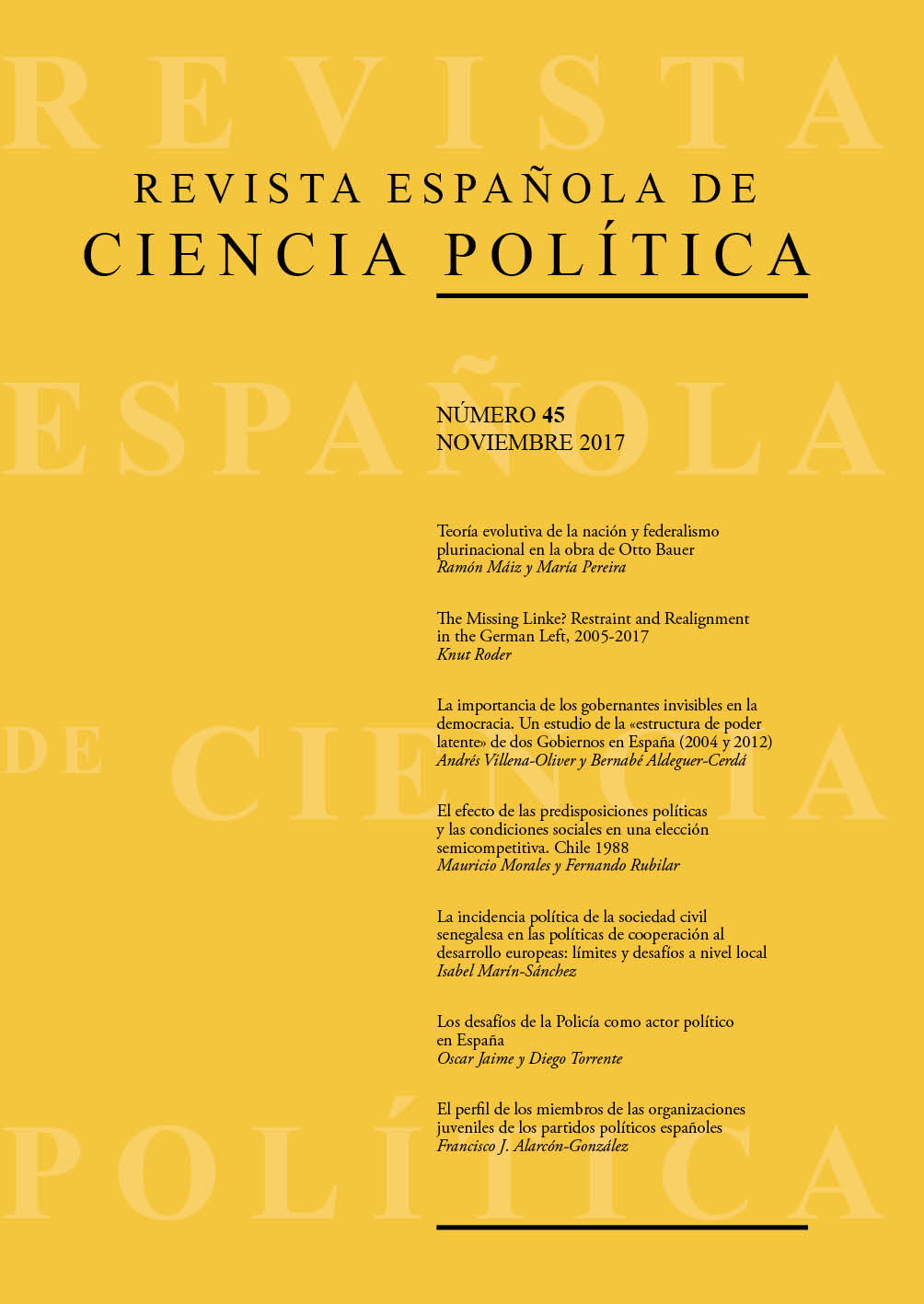Challenges of the Police as a political actor in Spain
DOI:
https://doi.org/10.21308/recp.45.06Keywords:
Police, politics, security, crime, Law, social crisis.Abstract
Over the past decades, police forces have evolved significantly as a result of the structural changes that have taken place in democratic societies. The growing delegitimization of representative political institutions; the empowerment of citizens; the crisis of the welfare state and the consequences of socioeconomic globalization have shaped a scenario in which a classic institution, such as the police, is struggling to relocate itself in an ambiguous space. This is leading to its overlap with other institutional actors and some glimpse of an identity crisis. The aim of this article is to investigate the challenges that Spanish police forces are facing as political actors, in this context. In this scenario, a complex structure of interactions between the police forces, political-institutional decision-makers and various social actors is built. We define the profiles of such interaction in a variable geometry framework which is highly systemic and prone to stability. In this system of relationships, security forces face a structural bewilderment derived from their confused and weakened position caused by the hegemonic pressure put by: (1) empowered social actors; (2) demanding and increasingly delegitimized political decision-makers; and (3) increasingly sophisticated, complex and powerful professional challenges. The perspective of analysis is institutionalist, as it is assumed that the police institution conditions actors’ perceptions and interests, but these gain enough relevance and determination to influence an uncertain future scenario. The methodology is qualitative, and it is based on chief police officers' testimonies, whose speeches are interpreted in the light of previous relevant academic contributions. This research was founded by the Spanish National Science Program 2012-14.Downloads
References
Baumer, Eric P. y Janet L. Lauritsen. 2010. «Reporting crime to the Police 1973-2005: A multivariate analysis of the long-term trends in the national crime survey (NCS) and national victimization survey (NCVS)», Criminology, 48 (1): 131-185. Disponible en: https://doi.org/10.1111/j.1745-9125.2010.00182.x.
Bercal, Thomas E. 1970. «Calls for Police Assistance: Consumer Demands for Governmental Service», American Behavioural Scientist, 13 (5/6): 681-691. Disponible en: https://doi.org/10.1177/000276427001300504.
Blankenburg, Erhard. 1980. Politik del inneren Sicherheit. Frankfurt am Main: Suhrkamp.
Della Porta, Donatella. 1993. Police Knowledge and Public Order. Bolonia: European University Institute.
Fundación Policía Española. 2000. Seguridad pública y policía en el comienzo del siglo xxi . Madrid: Fundación Policía Española.
Gottfredson Michael. R. y James Hinderland. 1979. «A Study of the Behaviour of Law», American Sociological Review, 44: 3-18. Disponible en: https://doi.org/10.2307/2094813.
Kies, Marianne F. 2011. «Policing the Police: Freedom of the Press, the Right to Privacy, and Civilian Recordings of Police Activity», The George Washington Law Review, 80 (1): 274-310.
Loubet de Bayle, Jean-Louis. 1998. La policía. Aproximación sociopolítica. Madrid: Acento.
Lovell, Jarret S. 2002. Media Power and Information Control: A Study of Police Organizations and Media Relations. Newark: Rutgers University. Disponible en: Disponible en: https://www.ncjrs.gov/pdffiles1/nij/grants/197060.pdf [Consulta: 7 de julio de 2016].
Mattelart, Armand. 2007. Un mundo vigilado. Barcelona: Paidós.
Mawbya, Rob C. 1999. «Visibility, transparency and police-media relations», Policing and Society: An International Journal of Research and Policy, 9 (3): 263–286. Disponible en: https://doi.org/10.2307/2094813.
Naím, Moises. 2013. El fin del poder. Barcelona: Debate.
Reiner, Robert. 2000. The Politics of the Police. Oxford: Oxford University Press.
Reiss, Albert J. 1971. The police and the Public. New Haven: Yale University Press.
Robert, Philippe. 2003. El ciudadano, el delito y el Estado. Barcelona: Atelier.
Sabaté, Juli. 1984. «La profesión policial en España: Un análisis sociológico», Papers, 21: 133-152.
Serrano, Alfonso. 2011. «Dudosa fiabilidad de las estadísticas policiales sobre la criminalidad en España», Revista de Derecho Penal y Criminología, 6: 425-454.
Shapland, Joanna y John Vagg, 1988. Policing by the Public. Londres: Routledge.
Skogan, Wesley G. 1976. «Citizen Reporting of Crime: Some National Panel Data», Criminology, 13: 535-549. Disponible en: https://doi.org/10.1111/j.1745-9125.1976.tb00685.x.
Skogan, Wesley G. 1984. «Reporting Crimes to the Police. Status of the World Research», Journal of Research on Crime and Delinquency, 21 (2): 113-137. Disponible en: https://doi.org/10.1177/0022427884021002003.
Sparks, Richard F., Hazel G. Genn, y David J. Dodd. 1977. Surveying Victims: A Study of the Measurement of Criminal Victimization, Perceptions of Crime, and Attitudes to Criminal Justice. Nueva York: John Wiley.
Szczepanski, Jan. 1973. «El método biográfico», en René König (comp.), Tratado de sociología empírica. Madrid: Tecnos.
Valles, Miguel S. 2002. Entrevistas cualitativas. Madrid: Centro de Investigaciones Sociológicas.
Van Dijk, Jan, Robert Manchin, John Van Kesteren, Sami Nevala y Gergely Hideg. 2005. The Burden of Crime in the EU. Research Report: A Comparative Analysis of the European Crime and Safety Survey (EU ICS 2005). Disponible en: http://vorige.nrc.nl/redactie/binnenland/Misdaad.pdf [Consulta: 7 de julio de 2016].
Van Dijk, Jan y Peter Mayhew. 1992. Criminal victimization in the Industrialized World: Key findings of the 1989 and 1992 International Crime Surveys. The Hague: Ministry of Justice, Department of Crime Prevention.
Wilson, James. Q. 1978. Varieties of Police Behaviour. The Management of Law and Order in Eight Communities. Cambridge: Harvard University Press.
Zuloaga, Lohitzune. 2014. El espejismo de la seguridad ciudadana: claves de su presencia en la agenda política. Madrid: Los libros de la Catarata.
Published
How to Cite
Issue
Section
License
Copyright (c) 2017 Óscar Jaime; Diego Torrente

This work is licensed under a Creative Commons Attribution-NonCommercial-NoDerivatives 4.0 International License.






